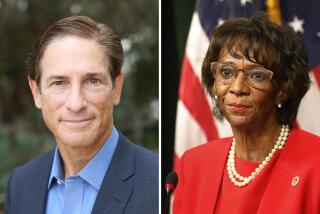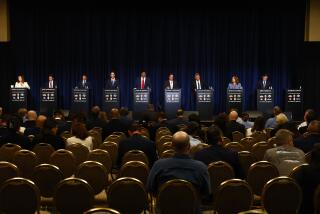Readers weren’t happy with what I had to say about D.A. Jackie Lacey — and neither was she
- Share via
They weighed in quickly and their message was clear.
With only a few exceptions, the readers who bothered to write did not like my recent column on Jackie Lacey’s husband pointing a gun at protesters who knocked on the door of the L.A. County district attorney’s on the eve of the election.
Lacey wasn’t too thrilled with my work, either. When I asked her if she wanted to talk about it, she said yes.
Don’t get the idea here that I’m ready and willing to meet with all my critics. That would take decades. But I respect Lacey, the first woman and first African American leader of the D.A.’s office, and so I paid her a visit Wednesday afternoon.
At that point, the two-term incumbent led two challengers in her bid for reelection, taking about 50% of the votes while the others split the rest. But it was not yet clear — and still isn’t — whether Lacey will finish the race above 50% and thereby avoid a November runoff against the second-place finisher.
Why it takes so long to count votes in the state that invented technology is beyond me, and I’m wondering if messenger pigeons would be an improvement.
Before I get to what Lacey told me, I have to say, I still think it wasn’t the best idea for the husband of the county’s top law enforcement official to threaten to shoot Black Lives Matter protesters. But Lacey has been somewhat circumspect about the incident, and readers came to her husband’s defense.
“Jackie Lacey has received death threats and harassment. ... It’s a wonder the rudely awakened Mr. Lacey did not shoot anyone,” said one. According to Lacey, her husband later apologized for waving his gun.
“Mr. Lacey was simply standing his ground, protecting his wife and property. It’s his home and the Black Lives Matter people should have respected that,” said another reader.
I wrote that Lacey might have avoided the scene if she had met with critics, as promised. But readers kicked me in the shins on that point, too.
“As to the notion that she should have met with the Black Lives Matter group,” said one, “they lost any right to that when they deprived her of her 1st Amendment right to speech by shouting her down during a campaign debate.”
When I sat face-to-face with Lacey, she told me she knew she surrendered some of her privacy the moment she became D.A. And while she defended the 1st Amendment right to free speech, she said she objects to the tactics used by her vocal critics, some of whom disrupted a candidate forum she participated in, and she thinks her home should be off-limits.
“I think to call this a protest is miscategorizing it,” she said.
Lacey told me she expected that when she was ready to head home on the day we spoke, protesters would be outside her office waving signs and calling for her ouster.
“I think that’s fair, and I even think it’s fair if they want to show up at a public event,” Lacey said.
But twice now they’ve come to her home.
“They didn’t come onto the property” the first time, Lacey said, but they did startle her. “What they do is they beat the drums to wake up everybody in the neighborhood because they’re trying to embarrass me.”
Last week, she said, they crossed a line.
“This time they were on the property and they were ringing the doorbell,” Lacey said. “Peaceful protest is one thing. Speaking out is one thing. But bullying is when you are screaming and yelling and trying to embarrass somebody into doing what you want them to do … and what they want me to do is file criminal charges against every police officer who shoots someone in L.A. County. That’s what they want.”
She described another incident that crossed a line for her last May, when she attended a mental health event and art exhibit.
“I was just in there with my family members looking at artwork, and suddenly a group rushed toward me and started screaming and yelling at me. So my security team grabbed me and backed me out of a circle of angry people and … I fell to the ground,” Lacey said. “And you’re thinking, are these people going to kick me in the head?”
As I said in the first column, I get her frustration. If I were a public official, I wouldn’t want people rushing me or marching on my home.
But I also get the points critics are making, even if their tactics are debatable. As my colleague Sandy Banks wrote, some in the black community celebrated Lacey’s rise eight years ago, but soured on her after two terms.
As they see it, mass incarceration of poor young men of color is unconscionable in L.A. and beyond. They argue that Lacey isn’t doing enough about it, even as prosecutors in other parts of the country are embracing criminal justice reform and calling for reduced charges, lower penalties, more diversion and an end to the death penalty.
They claim Lacey has dragged her feet or chosen not to file in high-profile police shootings involving victims of color, even when the officers were fired for their actions and millions in settlements were paid. In one case, even then-LAPD Chief Charlie Beck urged Lacey to prosecute an officer who killed a homeless man during a tussle in Venice. She chose not to.
And then there’s the case of the white Democratic donor and West Hollywood resident Ed Buck, who allegedly plied young gay black men with drugs. Critics screamed for Lacey to prosecute, but it was only last fall, after a second man died at Buck’s home, that charges were filed.
Lacey sees it differently, arguing that her decisions on individual cases are guided by laws and not public persuasion. She grew up in South L.A., where she sometimes worried about her safety as a child. Later, her father was shot and wounded after painting over some graffiti.
There’s not enough focus, Lacey told me, on the victims of crime.
Lacey’s bid for reelection drew national attention because her opponents — former police officer and San Francisco D.A. George Gascón, and former public defender Rachel Rossi — campaigned as criminal justice reformers.
Lacey said she thinks the early election results reflect an affirmation of her policies.
“People want to be safe,” she told me.
And what about the disproportionate number of minorities behind bars?
“It’s not lost on me,” Lacey said. “But ... when someone of color commits a violent crime, what is your obligation as a prosecutor? I think your obligation is to make sure that whatever your decision is, you make it not based on race.”
“I don’t pretend to have all the answers on this,” Lacey said, but the way to address poverty is with “better schools and opportunities, it seems, for African American and brown children.”
Lacey argued that she’s been a reformer, too. She mentioned her role in the dismissal of 66,000 marijuana convictions, but some critics saw that as politically convenient timing, coming three weeks before an election in which her challengers were running to her left.
Lacey said that she has tried to divert as many mentally ill people as possible into treatment and other programs rather than incarceration, but that there aren’t enough options available yet. And she would like to see her office focus more on diversion for juvenile defendants.
As Lacey predicted, protesters were outside when I left her office. They included the family of Anthony Vargas, a 21-year-old man shot and killed by sheriff’s deputies in a controversial 2018 incident in East Los Angeles.
A Vargas family member, along with two protesters who had gone to Lacey’s home last week — Greg Akili and Melina Abdullah — told me they want more accountability from Lacey. Akili said he’d like to see Lacey prosecute the crimes of police with the same zeal she uses in prosecuting citizens.
“This ‘lock ‘em up and throw away the key’ mentality has made America the largest jailer in the world ... it hasn’t proved necessarily to make us any safer, it’s only proved to criminalize us,” Akili said.
He offered no apologies for the protest at Lacey’s home.
“The civil rights movement, the labor movement and the women’s movement never would have changed anything if people were polite and respectful,” Akili said.
So as the rest of the votes are counted, is there any way forward?
I’m going to be optimistic and say yes, if the protesters are willing to stop being so provocative and engage in constructive conversation, and if Lacey is willing to elaborate on her comments to me about juvenile diversion and other reforms.
“I can always see a point to a meeting,” Lacey said, “as long as there’s a mediator.”
steve.lopez@latimes.com
More to Read
Sign up for Essential California
The most important California stories and recommendations in your inbox every morning.
You may occasionally receive promotional content from the Los Angeles Times.














